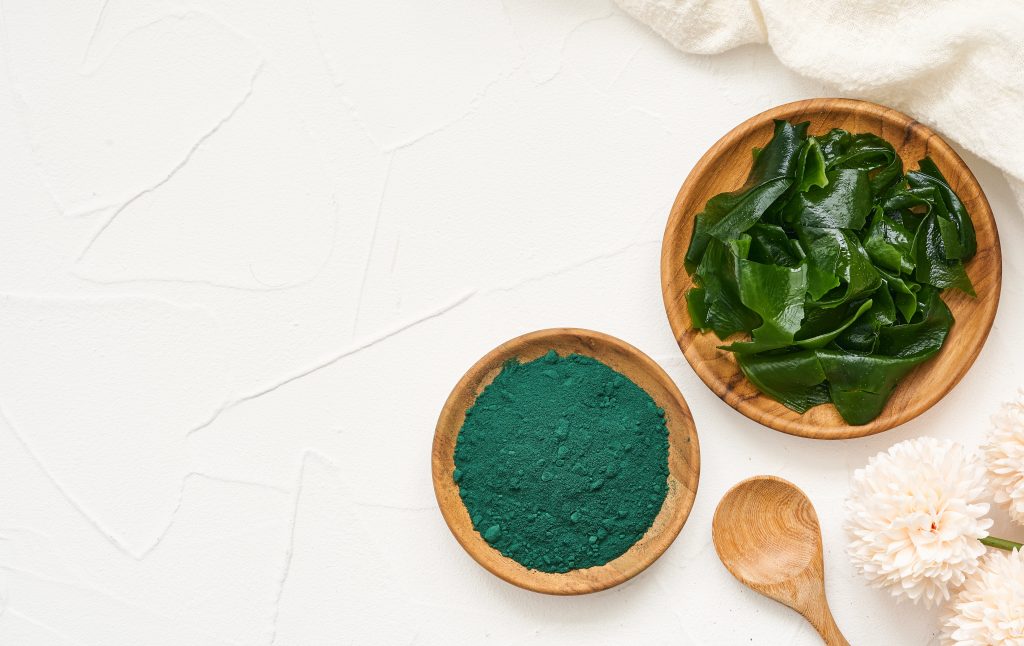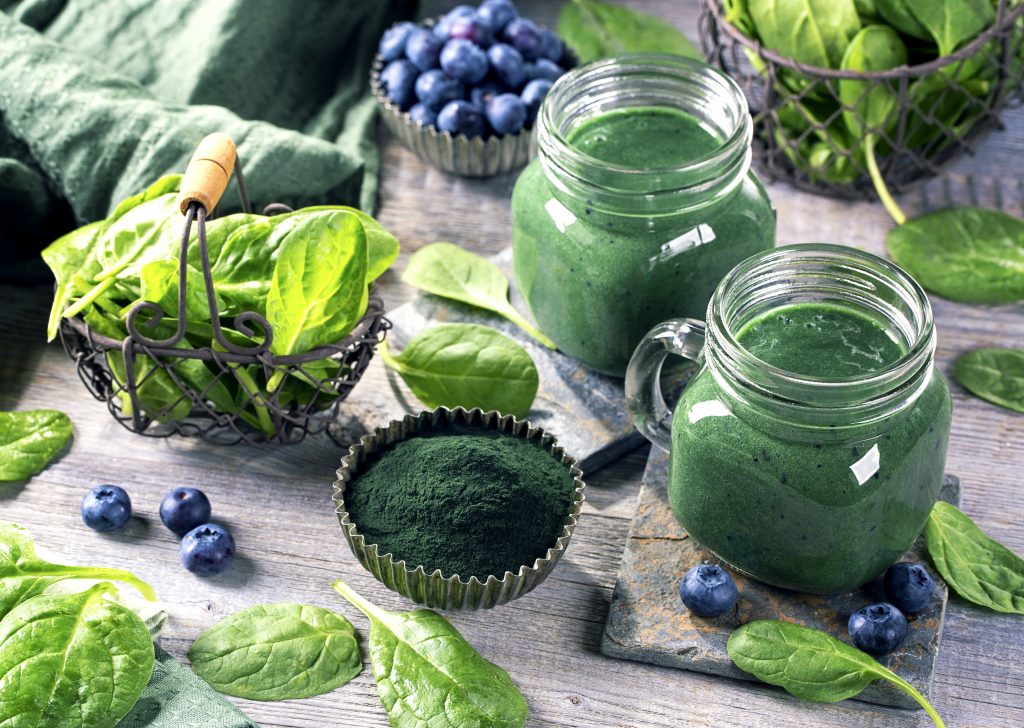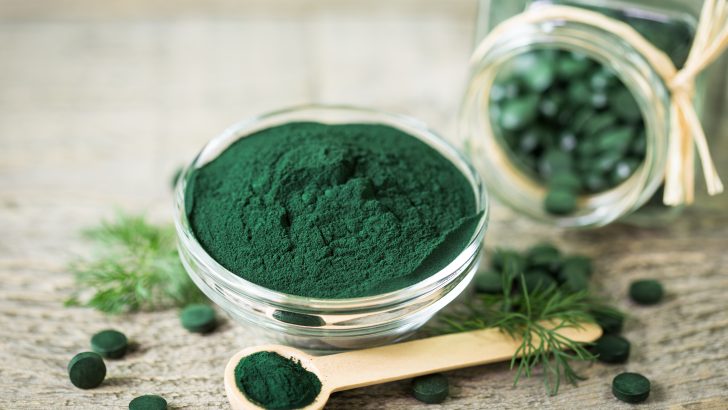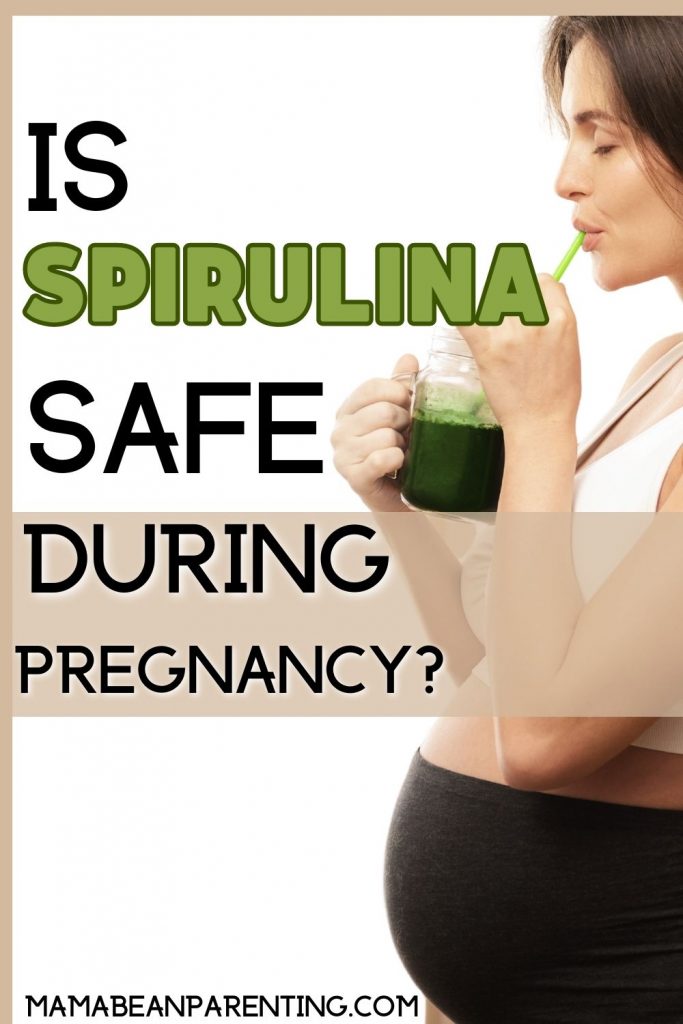Is spirulina safe during pregnancy? Is it a good choice for pregnant women?
Well, keep reading this article, and you will find out. Being pregnant means taking good care of your diet and everything else.
You don’t want anything to affect your baby or your health negatively.
If you’re wondering is spirulina safe during pregnancy, you’re probably interested in taking some high-quality supplements.
When you’re pregnant, you need more nutrients to keep your unborn baby healthy.
Baby needs certain things to grow and develop properly, so you want to consume something healthy to ensure a healthy baby and pregnancy.
Maybe you’re someone who’s a fan of spirulina, and now that you’re pregnant, you want to keep using it.
This article will give you more information about consuming spirulina while pregnant.
Also, you will learn some useful things about spirulina itself. Being pregnant constantly makes you learn more about food, which can only be useful for you.
Is Spirulina Safe During Pregnancy?

Before we explain everything about spirulina and being pregnant, let’s answer the main question – is spirulina safe during pregnancy?
Unfortunately, there is no correct answer to this question. There aren’t enough studies showing spirulina’s effect on pregnant women.
It would be wrong to tell you something is safe or unsafe to use without proof. But you’re here to learn more about spirulina safety during pregnancy, so we’ll talk more about it.
Most professionals will say that spirulina is safe during pregnancy. There isn’t evidence to support this, but there is also no evidence to say otherwise.
Many people will tell you to check with your doctor if is spirulina safe during pregnancy including me. Just don’t be surprised if the doctor tells you that he or she doesn’t know if spirulina is safe during pregnancy.
From my research, if you want a yes or no answer, most healthcare professionals will tell you that in general – it’s safe to consume spirulina during pregnancy in moderation.
Spirulina is a popular dietary supplement, with many positive effects on your health. Of course, even healthy things can cause negative reactions.
But, since spirulina is considered healthy, most experts will tell you to consume spirulina when pregnant.
If you want to make your own decision, let’s learn more about spirulina in general and its positive and negative effects.
What Is Spirulina?

Spirulina is a type of blue-green algae or cyanobacteria. In the past, people consume spirulina as a plan, and they’ve prepared meals from spirulina.
Nowadays, spirulina is mostly consumed as a dietary supplement. You can find it in the form of capsules, tablets, or powder.
Spirulina contains many powerful nutrients and antioxidants that benefit the human body.
It contains all essential amino acids and proteins, which makes it a great supplement for consumption.
Besides essential amino acids, it also contains omega-3 and omega-6 fatty acids which are important for normal body functioning.
There are many vitamins in spirulina:
- vitamin B1 or Thiamine,
- vitamin B2 or Riboflavin,
- vitamin B3 or Niacin,
- vitamin B5 or Pantothenic acid,
- vitamin B6,
- vitamin B9 or folate (folic acid),
- vitamin B12, vitamin C,
- vitamin D,
- vitamin E,
- vitamin K.
Folic acid is very important to take during pregnancy. It helps your baby’s brain to develop properly.
Spirulina is also rich in minerals – calcium, iron, magnesium, manganese, phosphorus, potassium, zinc, and sodium.
As you can see, spirulina is a popular supplement for a reason. It’s rare to find a supplement that contains so many beneficial ingredients.
All these nutrients are essential for human health. It can be difficult to get enough essential nutrients from food, so people take supplements.
There are many kinds of dietary supplements, but spirulina is so popular because it’s considered natural.
It has anti-inflammatory and antibacterial properties. It has a positive effect on blood pressure and blood sugar levels.
It’s also great for boosting your immune system.
As a pregnant woman, you’re probably using some prescribed supplement. You need an additional dose of nutrients every day to sustain your pregnancy and stay healthy.
Consuming spirulina during pregnancy sounds great. It’s natural, and it’s a great source of nutrients.
This is the reason why healthcare professionals can’t tell you to stay away from spirulina while pregnant.
It’s very good for your health, so they don’t know how to approach this dilemma.
Before I tell you more about the positive effects and health benefits of spirulina, I want to talk about the possible negative effects of this supplement.
Negative Effects Of Spirulina

Every food and drink we consume can have some side effects. It all depends on our physical state, health, sensitivity, and consumed amount.
Contamination
Since spirulina is an alga that grows in water, it can be contaminated. Spirulina will also be contaminated if the water is polluted with heavy metals, bacteria, or other harmful things.
Another thing about spirulina is the fact it can produce microcystins.
Microcystins are toxins and their main role is being a defense mechanism of spirulina.
Experts have found a way to remove these toxins, and most of spirulina plants are now grown in safe areas without polluted water.
Still, it’s important to buy safe spirulina supplements.
There were situations when microcystins, heavy metals, and other harmful things were a part of spirulina supplements because the spirulina didn’t come from a controlled environment.
You could be wondering how people in the past consumed spirulina as a food, without any analysis. Well, the waters were, and there were fewer harmful germs around people.
Nowadays, we must pay attention to the quality of everything we consume. This is even more important if you’re pregnant.
You have to protect your child from everything negative. If this side effect of spirulina doesn’t concern you, then you probably know where to find safe, high-quality spirulina.
Autoimmune Disease
Another negative effect of spirulina could be connected to your immune system.
This powerful supplement is great for boosting your immunity, but if you have an autoimmune condition, it might harm you.
Avoid spirulina supplements if you have lupus, multiple sclerosis, celiac disease, Addison disease, or some other autoimmune condition.
You shouldn’t consume anything without your doctor’s approval when sick.
Phenylketonuria
Spirulina contains all amino acids, including phenylalanine. Because of this, people with a genetic disease called phenylketonuria should avoid spirulina.
Blood-Clotting Problems
Spirulina works as a natural anti-coagulant, which is good for someone with high blood pressure.
However, if you have problems with bleeding, blood clotting, or you’re taking anticoagulant medications, spirulina might be harmful to your health.
Allergies Or Sensitivity
Finally, spirulina can have a negative effect on someone just because that person is allergic to spirulina.
It’s possible to be allergic to everything, so it’s no wonder that spirulina could be a potential allergen.
In some cases, people are not allergic to spirulina, but their digestive system is a bit sensitive, and they have stomach problems.
Some people experience diarrhea, vomiting, painful stomach, and similar symptoms every time they consume spirulina.
Vitamin B12 Deficiency
Spirulina contains so many vitamins, but it will not help you if you need vitamin B12.
Therefore, if you think that this is the supplement that will help you, don’t bother taking it for that condition.
Being Cautious
As you can see, spirulina is very powerful, and you should consume it with caution. If you consume contaminated spirulina, all those harmful ingredients will do more harm to your baby.
If you still want to consume this supplement, you have to find high-quality, recommended products.
Be careful if you have some medical condition, and always ask your doctor.
It’s possible that your doctor won’t give you an answer, but you have to ask to feel safer.
If you think that it’s okay for you to consume spirulina, and if you’re someone who’s experienced in using it, let’s learn something about the positive effects of spirulina.
Positive Effects And Health Benefits Of Spirulina

It’s hard to decide if something is safe to consume when pregnant without scientific proof.
Is spirulina safe during pregnancy? Maybe. Is it risky to consume spirulina when pregnant? It could be.
Everybody has a choice, and if you’re leaning toward consuming spirulina during pregnancy, it’s only fair to say the positive properties of this powerful supplement.
I’ve mentioned that spirulina contains some amazing nutrients, and they can have many positive effects on your body.
Anti-Cancer Effect
Since it’s saturated with antioxidants and other healthy nutrients, spirulina can help prevent cancer and it can help people who already have it. It makes you more resilient and strong.
Immunity Boost
I’ve mentioned that spirulina is great for your immune system. Since many conditions are connected to weak immunity, this supplement can help you fight those conditions.
Heart Health
Spirulina contains potassium which is crucial for managing high blood pressure. You might be interested in using spirulina if you’re a pregnant woman struggling with high blood pressure.
Diabetes
Spirulina can help people who have diabetes to keep their blood sugar levels under control. However, it’s important to monitor those levels because spirulina could lower them too much.
Allergies
If you have certain allergies, boosting your immune system is beneficial. Therefore, spirulina could be your weapon to fight those annoying allergies.
Anemia
Spirulina is rich in many nutrients, including iron, essential for treating anemia. If you’re anemic, spirulina could help you a lot.
Gut Problems
Since spirula contains so many powerful ingredients, it could also positively affect your gut health.
Cholesterol
Spirulina doesn’t contain a lot of fat, and since it contains omega-3 and omega-6 fatty acids, it’s great for lowering bad cholesterol.
Weight Loss And Muscle Growth
Spirulina is a great supplement for people looking to lose weight and gain muscles. It contains protein which is essential for muscle growth.
Protein is also good for weight loss because it keeps you full for a long time and has fewer calories.
Spirulina Recipes

I always like to give some good recipes when I write about food. Even if you’re sure that you won’t be taking spirulina while pregnant, it’s good to save some of these recipes for the future.
For creating something delicious, you will need spirulina powder. Make sure you find a high-quality spirulina powder, to avoid potential side effects.
Since you only need a teaspoon of spirulina powder per day, you can add this ingredient to many things. Experimenting will lead you to some amazing combinations.
I will give you a couple of easy recipes that will help you to incorporate spirulina into your diet.
Spirulina Smoothie
Everything that doesn’t taste so good can be amazing when you put it in a smoothie.
The best spirulina smoothie is made of bananas, greek yogurt, coconut milk, mango, and spirulina powder.
Add one banana to a blender, ½ of greek yogurt, a splash of coconut milk, a few cubes of mango, and a teaspoon of spirulina powder. You can change these amounts to your preferences.
If the mixture seems too thick, you can always add more coconut milk.
Smoothies are the most convenient ways to consume healthy things. You can always try different combinations of fruit and vegetables.
Spirulina Dessert
Spirulina powder can also be transformed into delicious desserts. You need to blend a cup of dates, a cup of almonds, and one teaspoon of spirulina powder.
If the mixture can’t be molded into small balls, add some almond milk. When you roll your sweet balls, you can pour some melted dark chocolate over them.
Spirulina Pancakes
The best thing about pancakes is that you can add different things to the mixture to make it more delicious or healthier.
You can simply add one teaspoon of spirulina to your usual pancake mixture, or you can find some healthy options.
You could make a mixture from one egg, mashed banana, milk, almond flour, or regular flour. Add spirulina powder, and mix it well.
If the mixture is too thick, add more milk.
If it’s too runny, add more flour, or another banana. You can even add some chocolate chips to this mixture.
How To Make The Right Choice?

Being pregnant gives you many dilemmas and questions. There are so many questions, but there are no answers to all of them.
Consuming ashwagandha or taro-boba during pregnancy is also something that requires you to make a decision about their safety for you and your baby.
There are no studies about this, so the choice is in your hands.
Eating caviar is also not forbidden, but there are things that require your attention when choosing a caviar.
Pastrami and ceviche during pregnancy are only allowed if you cook them.
As you can see, being pregnant can be stressful, especially when you’re interested in consuming something that’s not analyzed too well.
I always like to advise pregnant women to stay safe. Ultimately, it’s your choice and it’s your risk, so you do whatever you feel like doing.
I just feel that so many foods and drinks aren’t risky at all, and there is no point in consuming things that can be harmful for some reason.
There are other amazing supplements, and spirulina can wait a while. Being pregnant means you have to protect your baby and yourself.
At the end of the day, you won’t be sorry if you cause a negative reaction for yourself. But, if something happens to your baby, you will never forgive yourself.
Being safe for a few months is possible, and you can always find a replacement for certain things. You can even find something to replace an unhealthy craving.
You just have to do your research and ask for a professional opinion.
Pregnancy and spirulina are a mystery for now, and some things aren’t good to explore when you’re carrying a baby in your womb.
Vitamins and minerals are crucial for a healthy diet, but you can find other sources that will be safer for now.
Conclusion

If you were wondering is spirulina safe during pregnancy, this article made you even more confused.
Certain things are great for our health, but it’s hard to do research studies on pregnant women.
It wouldn’t be ethical to do it because what if something happens to all those women?
Therefore, we can only guess if something is safe to consume while pregnant.
Spirulina has many health benefits, but nobody knows for sure how it affects pregnant women. Pregnancy and spirulina are not the safest combinations.
You can choose to consume it, but there are some risks. If you’re sure that you want to use spirulina as a pregnant woman, then please find a good spirulina supplement.
If you want to avoid risks while pregnant, consult with your doctor to give you some other recommendations for a dietary supplement.
Pregnancy is very limiting, but most things aren’t worth the risk. Focus on staying healthy and consuming safe products during pregnancy. Right now, your priority is your child, and everything that could jeopardize you or your baby shouldn’t be on your mind.
So, don’t ask yourself a question – is spirulina safe during pregnancy anymore. You have your answer and the rest is up to you.
Hi all, I am Sidney, an accountant, a hobbyist photographer, and a mother to two sweet girls who are my motivation. I love sharing the tips and tricks I gained all these years I’ve been a mother. I hope it will help you!


